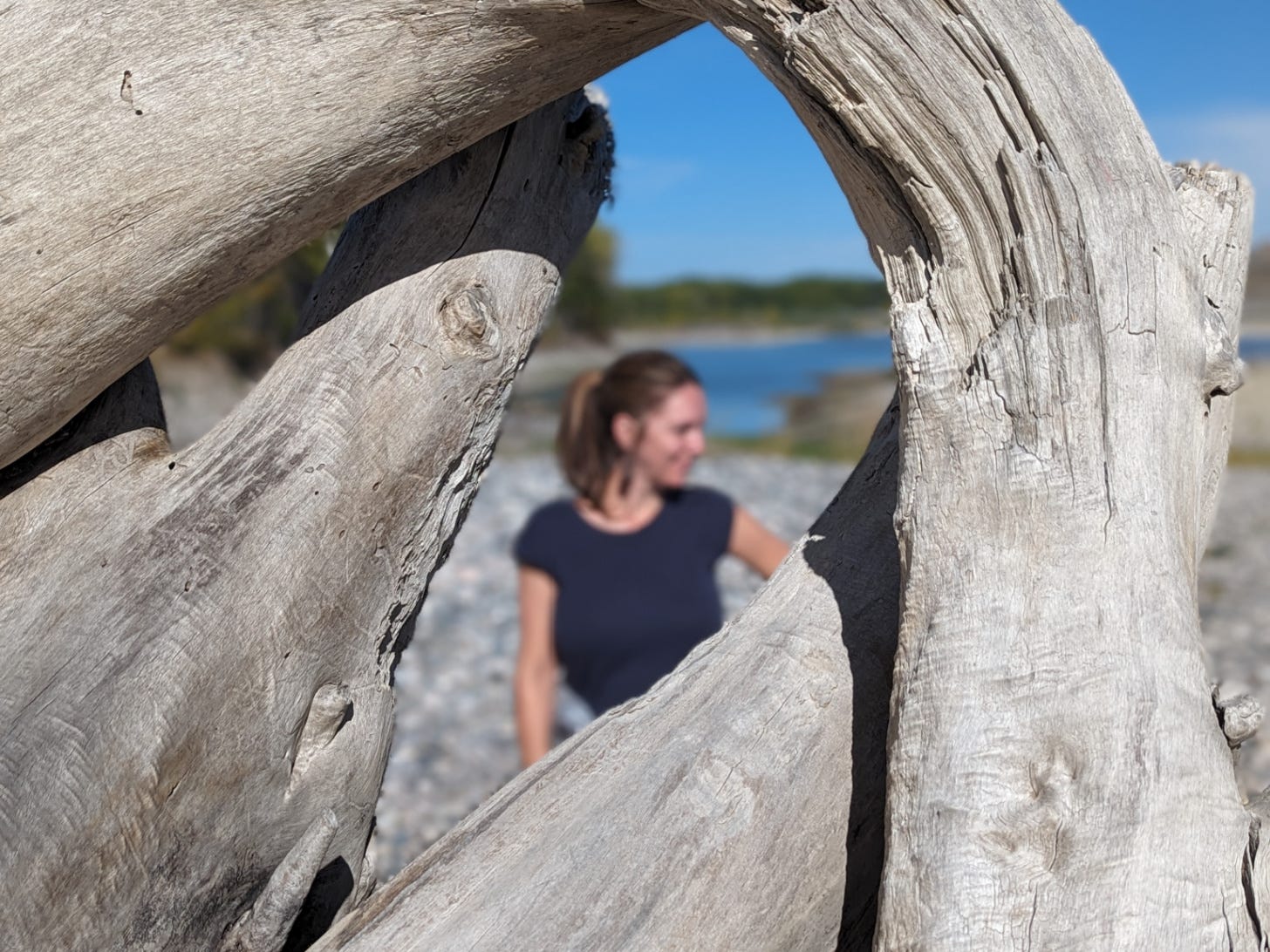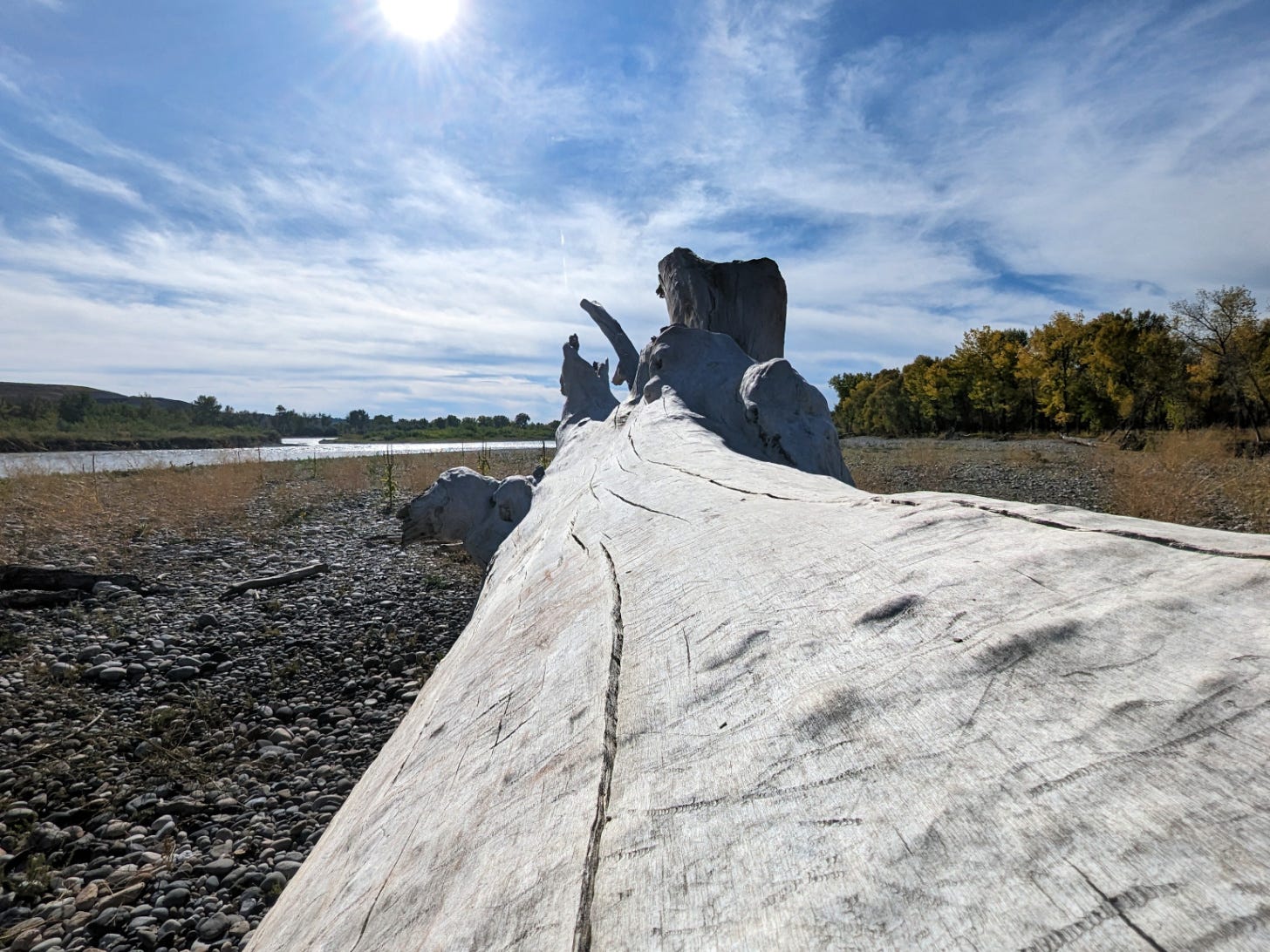The Next, Next Right Move
Fall Break Announcement
I just returned from time with my family in Montana. I got to walk along the Iichíilikaashaashe (it means Elk River), which is what my Apsáalooke (Crow) ancestors called the Yellowstone River.
On that river walk, I collected smooth pebbles, tumbled all the way down from the mountains to the plains, listened to the particular voice of icy cold water, and explored the huge, bleached white body of a cottonwood tree stranded on a sandbar. It reminded me of whale bones sometimes discovered on beaches. Maybe the cottonwood is the whale of the river, its spirit mixed into the water and air now. Its remains beached on the prairie. I also spent time looking in the far distance, which is so healing for the eyes, and easy to do in Montana where there’s still not too much to block our sight lines.
I am not Native American, but I do think a lot these days about what my grandfather tried (was it in desperation?) to pass on to me from our ancestors . . . what was left over for him to offer at the end of the line, after generations of genocide, ethnocide, boarding schools, and family separation. It feels important for me to really, really know it now.
What did my great-great-grandmother know before she was ripped away from Montana and sent to Carlisle? Montana herself has taught me, so what did she say to my great-great-grandmother when there was even less noise and even clearer sight lines? When her family was camped under the rims next to Iichíilikaashaashe did she learn something that she tried to hang on to through many years and hundreds of miles of separation, through stiff classrooms full of the propaganda of “America,” so she could someday tell her young grandson?
Did he still know it when he was an old man and I was his young granddaughter? Did I hear it? Can I hear it now?
My ancestor's voices aren’t the only Indigenous voices I’ve thought a lot about lately. I just finished reading the story of the Osage in Killers of the Flower Moon, watching the final season of Reservation Dogs, and I’m right in the middle of reading Braiding Sweetgrass. I just discovered Montana’s Poet Laureate here a few days ago,
, thanks to my husband hearing an interview on Yellowstone Public Radio during our trip. I’ve always been interested in these voices, but I’m particularly hungry for this other perspective now as I prepare to take a fall break and spend some time evaluating the decision I laid out in my first-ever note here, the decision to make “the next right move.”I keep coming back to a quote by Native American political activist and author, John Trudell, “I'm just a human being trying to make it in a world that is very rapidly losing its understanding of being human.”
Did my steps here with Notes from a Neighbor this last year help us hold on to our understanding of being human? Did what I had to say about community and caring for each other contribute to shifting the conversation away from such a narrow self-focused concept of well-being? If not, how do I refine the message? If I’m convinced, how do I better convince my neighbors that community is medicine (and not in a cute Instagram quote sort of way)?
Do I . . . do you . . . have a role in helping us remember to stay human in a world like ours?
Neighbors, I am taking my fall break, and this will be my last note for a few weeks. I’m using it to reflect on these questions, listen to voices that teach me a new perspective, and think about the next, next right move.
I’ll see you in a few weeks, but I hope that until then, you’ll let me know what you’re reflecting on this fall and whose voices you’re looking to for guidance. How would our world be different if we all had dedicated time each year to consider our next right move?




You ask:
Did my steps here with Notes from a Neighbor this last year help us hold on to our understanding of being human? Did what I had to say about community and caring for each other contribute to shifting the conversation away from such a narrow self-focused concept of well-being?
I answer with an enthusiastic YES to both these questions. I am so grateful for you and what you are doing here. The theme of community care keeps cropping up in different corners of my world, and it's so exciting to sense a larger shift taking place. I've shared Notes from a Neighbor with many people, several of whom I'm in now conversation with about how to create a more community care in our immediate circles.
I am currently listening to voices who are urging white settlers (particularly Christians) to engage in decolonization. I just finished Healing Haunted Histories: A Settler Discipleship of Decolonization by Ched Myers and Elaine Enns, and I've started The Land Is Not Empty: Following Jesus in Dismantling the Doctrine of Discovery. I'm also listening to a podcast titled "Mapping the Doctrine of Discovery."
I hope you have a wonderful fall break. I look forward to your next Note!
In gratitude,
Noelle
I am deeply grateful for the ways you continually call us to think / question beyond the narrow confines wellness culture!! There is so much about it that’s connected to toxic capitalism and colonialism.
I see unlearning and re-learning as an act of radical + collective liberation. And your work and words definitely help me along this journey. Thanks so much for sharing what you’re reading. I am adding these to my ever- growing list! Lol.
I am learning more about my own Afro-indigenous heritage... coming up on the anniversary of Dad’s passing and it feels like an even deeper desire to expand my understanding. There is such wisdom which has gone before us. ♥️